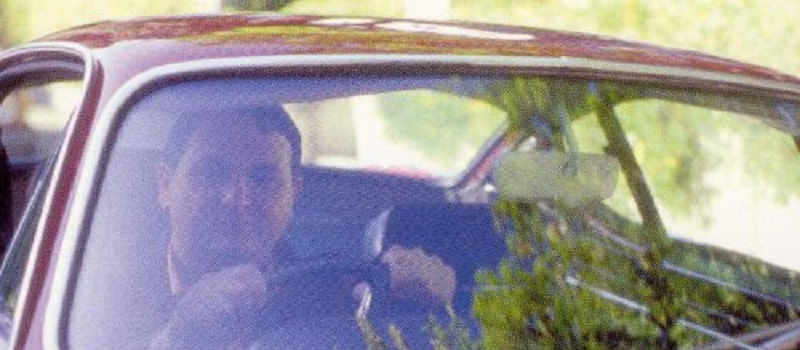If his work with The Bus Stop Label is any indication — and I get the feeling that it is — Andrew Sandoval must have Pet Sounds stuck on a permanent loop inside of his head. The latest offering from Andrew, appropriately titled Happy to Be Here, is a carefully studied exercise in 1960’s pop nostalgia, a kind of half-knowing tribute to The Beatles and Beach Boys and scores of guitar-driven pop acts who have dominated airwaves for the last 30 years.
Happy to Be Here is, essentially, a set of 11 songs that wouldn’t be out of place if they crawled onto the Top 40 charts in the fall of 1965. Each of the songs is dominated by guitars — no distortion here, kiddies — and Andrew’s tender vocals, sugar-coated with Hammond organ, tack piano and the obligatory backing “oohs” and “aahs,” and accented by the swells and flourishes of a small orchestra.
Andrew has clearly done his homework, and every verse and chorus seems very clearly plotted and diagramed, everything cunningly produced and set in its right place. Though none of Andrew’s songs tread much past the inherent four-minute pop song boundary, he manages to reference everyone from The Beach Boys and The Beatles to Elvis Costello to current pop troubadours like Jude and Ben Folds while not sounding exactly like any one of them.
The album opening “I Wish You Would,” “It May Never Happen,” and “Friend of Mine” are toe-tapping pop songs of the variety you would have heard in That Thing You Do. They get the blood moving, and you can help but imagine them being performed in front of Ed Sullivan himself. But, ultimately, they also seem to evaporate from memory a bit once the disc stops turning.
Among the record’s poppy ruminations, “Now” stands out as the result of some Hammond organ contributions that sound close to “96 Teardrops”-era Question Mark and The Mysterians. The pseudo-balladry of “Allyn White” is saved by occasional musical diversions, such as Andrew’s brief, light-hearted verse of “bop-ba-dops.” Elsewhere, the moans and wails of strings and horns step out of the background and further into the limelight, adding dimension and some sincere emotional punch to songs like “High Tower,” “Strange Dreams,” and “Tears Anyway.”
“He Can Fly,” however, may be one of the most surprising and rewarding tracks on Happy to Be Here. Starting with the giddy, repetitive bounce of a toy piano, the song begins to soar — pun fully intended here, everyone — with the use of pitch-perfect backing harmonies from guest vocalist Tom Dawes and a lone violin. With all of this lush pop density, you hardly notice that the song begins and ends sans electric guitar, the lifeblood of many a pop song.
Andrew pulls off similar results, though to more reflective ends, on the album-closing “Happy to Be Here.” Though it’s weighed down by some overly obvious lyrics — “At the end of the day, we turn out all the lights / And then we start to think about our lives / Yeah, yeah” — the song uses bits of piano, strings and layers of sugary vocals to an almost majestic effect. This is a song without guitars or drums, mind you, that could make a pop junkie like Ben Folds cry. Unfortunately, just when you’re waiting for it to let loose and make a bigger closing statement in its second half, it sort of fades, a solitary organ note left lingering to close the record.
If there’s one down side to the proceedings, however, it may be that the record is so careful to not extend itself beyond its self-imposed boundaries that it never quite defines or distinguishes itself. Andrew is obviously a capable songwriter and performer, but he doesn’t lend so much to the pop canon as he does display his idolatry for it. In his voice, at times, we can almost hear the soft-spoken pop musings of Jim O’Rourke circa Eureka and Insignificance. Thinking of O’Rourke — and how he has taken pop structures and orchestral splendor and mutated them into his own sonic devices — one begins to realize how derivative a work Happy to Be Here seems to be. It’s no so much a pop masterpiece as it is a cleverly produced pop apprentice-piece.
Then again, there are scores of indie pop scenesters who would probably sell the whole of their Kinks and Zombies collections — not to mention all those Pet Sounds outtakes — to sound half as good as Andrew does on much of his latest release. Happy to be here? Well, the company’s good and more than a few will probably says its one of 2003’s best-produced pieces of guitar pop. I know one person who’d be more than thrilled to come along for the ride. Does anyone have Burt Bacharach’s number? – Delusions of Adequacy May 27, 2003




